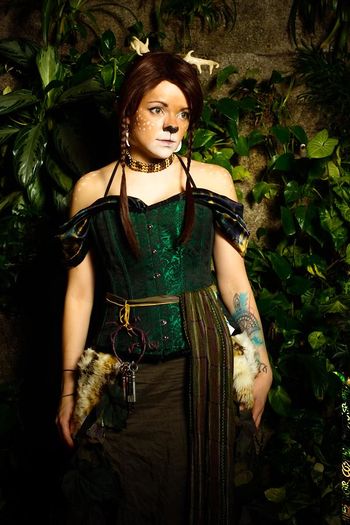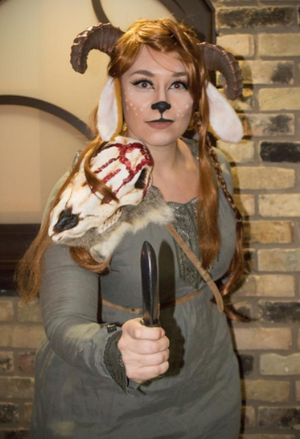Faun
Fauns are a benevolent and care-free race, often mistaken for Fae. In fact, they are forest spirits, given mortal form. This fact is something that fauns freely admit and embrace. Most fauns are friendly and compassionate, yet shy and reserved but there are exceptions to the rule. Fauns have a natural affinity for forests and will feel drawn toward them as a habitat. Spending more than a day or two in an urban environment will cause a faun to feel lonely and disconnected. Many call fauns “deer-kin” for their resemblance to the animal. They mature slowly after they reach young adulthood, spending many centuries as young adults before rapidly maturing into old age.
Language: Common (no language)
Life Expectancy: 1000 to 1200 years
Fauns do not have an adult maturity. At the age of one millennium they begin to rapidly show signs of elderly age.
| Child | 1 – 50 |
| Teenager | 51 – 500 |
| Young Adult | 501 – 999 |
| Mature | N/A |
| Middle Age | N/A |
| Old | 1000 + |
History
Fauns first began to appear on the continent of Maud’madir in the year 2257, though they are known to have existed far before then.
Fauns are said to have been adapted from woodland creatures by the grace of Arthos itself. Many millennia ago, when the forests were mere saplings, the Thalan, or ‘Grey Elves’, were the first to respect the forests and the bounty they provided. With the arrival of the other sentient races came the knowledge of worry and strife. Concerned about what might follow, the spirits of nature decided to create guardians for the forests. In eight places of strong magical power, deep in the heart of the ancient forest, they gathered four great stags and four powerful does. Eight spirits of the forest came forth from the depths of the Arthos and entered each of the deer. These spirits were named Mistletoe, Cliffsedge, Rosenthal, Yew, Oakborne, Firefly, Maplewhisper, and Evergreen. Over time, the spirits split and reproduced, but stayed hidden. For centuries they watched the world in silence, acting as the eyes and ears of the other forest spirits. They roamed the continent, quiet guardians of nature and those who would preserve it.
In 2257, the spirits could no longer stay dormant in the face of the overwhelming chaos and war caused by the arrival of Ga’more. Determined to protect their home, the eight spirits compelled the Fauns’ forms to split into the Fauns we know today.
Geography
Faun herds are named after their founders and progenitors. These herds will sometimes group together in larger herds, forming the closest analogs to a Faun nation. The largest herds are said to have been founded by the first eight Fauns that ever came into existence.
The 8 Herds
Fauns who hail from Mistletoe are known for complex riddles, games of wit, and poetry. There is constant music coming from their living centre. Many of the Fauns of Mistletoe have skill in string, wind, and percussion instruments.
Cliffsedge
The Fauns of Cliffsedge experience little trade or communication with other herds. In the past they experienced difficult years of famine after a devastating drought. These Fauns have grown aggressively protective of the land they slaved over to return to its full potential and are seen by other Faun herds as being uncomfortably territorial.
Rosenthal
The Fauns of Rosenthal are diverse in crafting ability and their herd has become a centre of trade. Because of the large number of Fauns from other herds they attract, they are also a hub for information. These Fauns are smart, practical, and dedicated to what they do.
Yew
Yew is known for its dense concentration of mages. The herd is centred around the founder’s Henge. The herd lives in luxury in an orchard of fruit trees maintained by the herd’s nature casters. Founder Yew is a highly respected elder, known in all herds, which gives Yew sway in the business of other herds.
Oakborne
The Fauns of Oakborne are talented carpenters. They create large wooden treehouses among mighty redwood trees and are known for their works of wooden art. They are very talented and focused craftsmen, taking great pride in the wooden totems around their village.
Firefly
Fauns from Firefly live on the Island of Duvain in a village surrounded by the insects of their namesake. Firefly Fauns are talented alchemists and farmers, using their various alchemical creations to naturally aid the growth of fruits and vegetables. At night, the herd is illuminated by the dull glow of tiny fireflies that flit about their homes.
Maplewhisper
Maplewhisper is the smallest of the eight herds. They are a group of mystics who are said to be able to commune with the forest itself. Fauns of Maplewhisper try to reconnect with their spiritual roots, and have many highly accomplished Healing casters among their number.
Evergreen
Fauns who hail from Evergreen are known far and wide for their beautiful paintings. They are part of a larger northern herd call Pinehold. Many Faun druids make their home there and create large works of art over years from within their Groves. Evergreen, their progenitor, is said to be within his Henge, a giant pine tree, still painting the same masterpiece he began when he was born.
Grouped Herds
Bloom
The herd of Bloom contains both the herd of Mistletoe and Rosenthal. Bloom is one of the largest Faun herds, and is a cultural hub of music, trade, and information. They often hold artisanal festivals and invite Fauns from all other herds to come and partake.
Pinehold
A herd in the snowy forests near Mjoll. Pinehold is home to the Evergreen herd, and frequently hosts visitors from Yew and Oakborne. The centre of the herd is founder Evergreen’s mighty pine tree Henge.
Culture
Most Fauns form small herds which average populations of around 50 individuals. Herds are often named after their founder. Herds consist of three or four families, often connected through mateships and the resulting children. When families expand too quickly and the group can no longer live off the land without harming it, the herd splits in two. One half ventures out of the herd’s territory to find fertile land elsewhere in the forest while the other remains behind. Herds are formally led by the eldest druids in the community, but it is common for herds of Fauns to practise direct democracy, where the adults of the herd come together to form a consensus on larger decisions for the group. Fauns value family above all else and the well-being of the whole herd is the priority in all decisions made. All members of the herd participate in raising and teaching the many children.
Vegetarian Diet
Most Fauns practise vegetarianism. While they do not usually farm, they will plant fruit trees and berry bushes wherever there is an appropriate piece of land or where they will feel the tree or bush will be aesthetically pleasing. Along with these fruits and berries, they will also forage for wild vegetables, mushrooms, and herbs. Because of their rarity, nuts are considered a delicacy and are stored until festivals and celebrations where they are passed around in large wooden bowls. When the bodies of dead animals are found, Fauns take the skins to be tanned for blankets and clothing, leaving the meat, blood, and organs for scavengers.
Religion & Spirituality
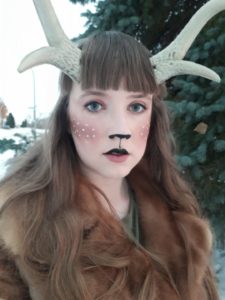 At first Fauns had little knowledge of gods and dragons, seldom going out of their way to appease, worship, or follow any, unless they had a personal experience with a greater power. Since Dunarthos became the world tree, Dunarthos worship has become incredibly widespread among Fauns.
At first Fauns had little knowledge of gods and dragons, seldom going out of their way to appease, worship, or follow any, unless they had a personal experience with a greater power. Since Dunarthos became the world tree, Dunarthos worship has become incredibly widespread among Fauns.
Fauns have frequent and vibrant celebrations of events in the herd, heavily valuing fertility and family. Fauns take great pride and joy in maintaining and helping the forests grow, and over the centuries have helped the forests flourish. Fauns feel a kinship with the animals of the woods and form deep bonds with these animals. Their spiritual connection to and value of all things living allows them to tie their lives to others’, using their life force and the life force of the forest to help their families and companions in times of great need. While much of their time is dedicated to the land and family, Fauns have plenty of opportunity to develop skills and hobbies. Herds tend to favour particular specializations and crafts. During the changing of the season, Fauns will travel to other herds to barter and hear news from other parts of the forest.
Mating & Children
Fauns don’t tend to fall in and out of love, or enter and exit relationships easily. Herds will often pair up individuals from a young age, not by formal agreement but by underhandedly ensuring they participate in the same lessons, forage together, and eat from the same bowl during feasts. Fauns believe that all types of love come from familiarity. Fauns usually form mateships during their young adulthood. Once a mateship is formed, and approved by the elders, the two are bound for life.
The forming of a mateship is considered a time to reflect rather than celebrate. To formalize the mateship, the pair will wander into the forest and spend a full day and night together to test their compatibility away from family influence. Upon their return the two stay at each other’s side while going through the daily motions of the herd. If these two days are successful, the elders recognise them as mated. If the test is unsuccessful the herd will act as though it never happened. On the night of a successful mateship, members of the herd will leave bowls of strawberries at the pair’s sleeping place as a symbol of romantic love and fertility. Fauns quickly become very loyal to, passionate with, and fiercely protective of their partner. Once mated, Fauns will typically bear between 5 and 10 children over many centuries. Children are named after family members, ancestors, or aspects of nature.
Separation of mated Fauns is rare. Though not explicitly against any rule, it only occurs under extreme circumstances. Upon the death of a mated Faun, the widowed Faun will have a short period of mourning, after which they seek out love once more. The Fauns believe that wasting time mourning is also wasting possible time spent in love and admiration for another. It is taboo for a widower to wallow in despair rather than seek out another in mateship.
Coming of Age
Milestones in ageing and maturity have great significance in Faun culture. Numerous occasions are celebrated for each stage of life. Milestones in maturity are celebrated by honouring the individual with small gifts, which often consist of natural jewellery like bracelets of flowers and sunflower seed earrings. Infancy ends when the young Faun’s horns begin to grow in, ranging in shape from antlers or ram horns to tree branches. When a Faun’s horns become large enough, young Fauns will begin to play by butting their heads together. When this occurs, the Faun is considered to have entered childhood. A Faun becomes a teenager when their horns develop a velvety coating. This coating is removed by the Fauns by scraping their horns against trees. At this point, their horns stop growing. As the Faun grows older and reaches adulthood, an elder of the herd will give the Faun a riddle. Often the riddle will pertain to a lesson the Faun must learn or an aspect of the Faun’s life. These riddles can take anywhere from years to decades to solve. Sometimes the riddle can only be understood by travelling the world and learning lessons that could not be obtained from life in the woods. Upon completing the riddle, the Faun is recognized as an adult by the herd. As adults, Fauns take on more responsibilities in the herd, like leading festivities and trading with other herds. After several centuries of life, they earn a place on the herd council. When Fauns reach a thousand years of age, they become the respected leaders of society, brimming with wisdom and harmony with nature. It is the goal of many young Fauns to reach their millennial and share the experiences of their thousand years with others.
Traditions & Beliefs
Fauns celebrate all aspects of life, but none more than the changing of the seasons. These celebrations involve weeks of feasting and provide an opportunity to honour and recognize the contributions of individual members of the herd.
For shelter, Fauns will spend decades gently moulding trees to grow in the shape of small huts and hovels. These are primarily used for nursing mothers and infants, or for storage. Fauns are content with sleeping in groups on mounds of moss, hammocks, or on large tree branches.
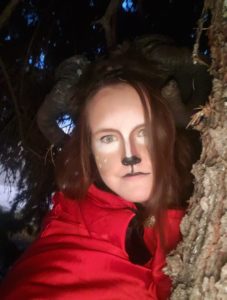 The coming of spring is a joyous occasion of new life during which the infants and children of the tribe are celebrated. Fauns host elaborate games and special activities for the young Fauns, including contests of bravery or wit, and elaborate plays and shows.
The coming of spring is a joyous occasion of new life during which the infants and children of the tribe are celebrated. Fauns host elaborate games and special activities for the young Fauns, including contests of bravery or wit, and elaborate plays and shows.
Summer is celebrated with the fermentation of apples and honours young couples. Fauns offer speeches of goodwill, luck, love, and life to the recently mated during large feasts. The Fauns spend weeks in revelry, enjoying the bounty of the summer.
Fall marks the busiest time of year and brings trading to its peak, as all herds strive to ensure they have enough supplies to bear the cold winter weather. Adults of the herd are recognised for their work in ensuring the well-being of the herd. Feasts are filled with discussions of news from other herds and the days are busy with preparation.
Winter is the most sombre season for Fauns. Days are spent in solemn reflection and feast nights are accompanied by grand stories of the Fauns of the past. Winter is a reminder that Fauns are not only living within the forest, but protecting it.
Fauns attach significant sentimental value to gifts and items they have collected throughout their lifetime. Fauns are known to hold onto items that remind them of decisions they’ve made, important times in their lives, interesting events, or their loved ones. A Faun may hold onto a small stone upon which their mate carved their initials, or an acorn that had stuck between their toes for days before they pried it out. Fauns will keep such trinkets on them for their entire lifetime – an older Faun may have a belt heavy with such items. To lose an item, or have it broken or stolen, devastates the Faun and they may experience a grief similar to that of losing a friend.
Politics
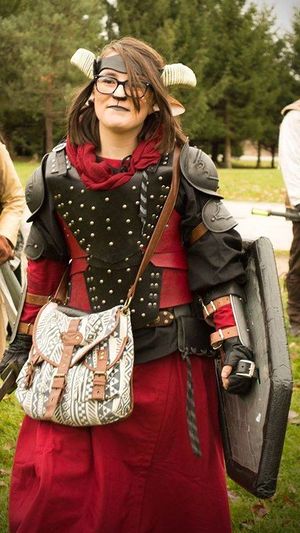 Faun herds are led by adults and elders of the herd in the form of a council. If the founder of the herd lives among them, they will act as the leader. If the founder leaves or dies, the council remains without electing a new leader. Old Fauns generally have the most influence over other council members, but decisions are made through consensus. While children and teenagers are not permitted to participate in the council, their welfare is always a priority during forums.
Faun herds are led by adults and elders of the herd in the form of a council. If the founder of the herd lives among them, they will act as the leader. If the founder leaves or dies, the council remains without electing a new leader. Old Fauns generally have the most influence over other council members, but decisions are made through consensus. While children and teenagers are not permitted to participate in the council, their welfare is always a priority during forums.
During autumn, council members travel to other herds along with traders to discuss the well-being of every herd. If a herd of Fauns becomes too aggressive, they will be embargoed. With the addition of interactions with other races, inter-herd meetings are becoming more frequent and intense, as Fauns debate how to deal with these new influences. Embargoed herds have already begun trading and working with other races, though most remain wary.
Fauns do not have a formal military. They rely on individuals who take an interest in combat or magic to protect the herd. Steel weapons are very rare, as Fauns do not feel the need or have the necessary knowledge to produce them. When steel weapons are found, they are given to whoever shows interest and is seen as trustworthy enough for this responsibility. Though traditional Fauns will prefer staves, or bows and arrows, steel weapons are becoming more common in herds that have begun trading with other races.
Common Personalities & Views
Fauns are intimidated by the world outside of their forests, and their natural curiosity and liveliness is stunted by the unfamiliar surroundings, people, and cultures. Fauns come across as shy and quiet, though well-meaning.
Fauns initially lack of familiarity with how those outside their race interact and live. As they become more accustomed to towns and urban areas, their friendly and good-natured attitude becomes more evident – along with their naïve, trusting nature. This childlike optimism is not always a disadvantage. Thanks to the popularity of word games and riddles in Faun culture, Fauns will often think of lies as an invitation to play a game and respond with a play on words or an attempt to solve the riddle presented by the liar. Because of all this practice with verbal trickery, Fauns are typically quite good at spotting lies. Fauns who catch on to the less-than-honest and warring ways of other cultures easily adopt a quick tongue and wit, which they use to remain on the right side of trouble.
Views on Other Races
Fauns tend to get along well with other races that live with or close to nature and they have a natural trust for those who train as druids or in nature magic, regardless of their race. Grey Elves are extremely well respected in Faun culture.
The Fauns that do participate in trade and communication with other races prefer bartering with Wild Elves over others. Fauns also tend to gravitate towards other bestial races. They respect the hardships and traditions of Savar’Aving people and are friendly with Wolven despite the differences in their organisational structures. Fauns tend to gravitate towards Hoblings and Wood Fae because of their friendly and gay natures.
Fauns who spend time interacting with humans distrust them greatly and are put off by their lack of distinct culture. Because of this, Fauns often share a stigma against races that are similar to humans. An exception to this is the Ajaunti, with whom Fauns tend to get along greatly, enjoying the merriment of caravans, Ajaunti music, rhymes, riddles and games. It is common for Fauns to travel with Ajaunti when going from place to place.
Fauns do not approve of the violent nature of Einher and Ice Elves, and want no part of their racial disagreements, shunning both races for their actions. Other war-like races receive the same cold shoulder.
Roleplaying Tips
- Fauns love and respect nature and animals.
- Fauns are adept at riddles and wordplay and love to make puns and similar jokes.
- Fauns take friendship and love very seriously. They are loyal and passionate companions.
- Fauns are not usually accustomed to urban living and will have difficulty understanding different cultures, systems of rule, and law.
- Fauns get along well with more nature-based and jovial races, and less with more cold and aggressive races.
- Some potential reasons to leave home include deforestation, religious awakening, becoming an outcast for violating Faun tradition, and seeking adventure.


